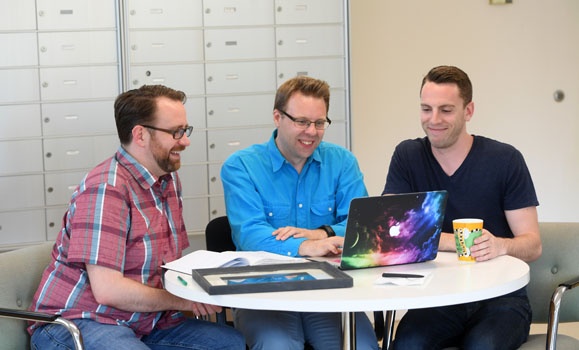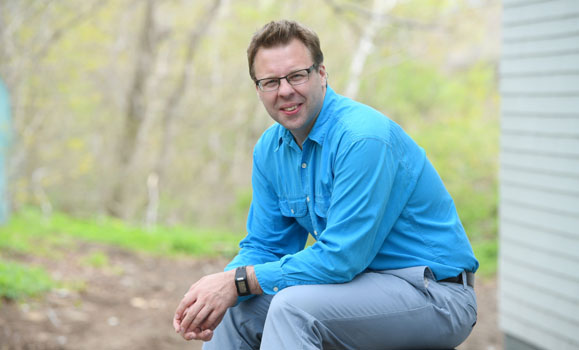
Phillip Joy has traded in his lab coat for a camera. A dietician by trade, Phillip is no stranger to the lab. But as a doctoral candidate in the Faculty of Health and the recipient of a Killam Laureate scholarship, a highly prestigious award given to some of Canada’s most innovative grad student researchers, Phillip isn’t content taking the traditional research route for his PhD project.
“I spent a lot of time in a lab doing quantitative research and I got really disconnected from people,” says Phillip. “But when I stumbled across arts-based qualitative methodologies, I did a total 180. I thought – we can do this?”
Phillip’s PhD research focuses on the ways in which the narratives and images around sexuality, heteronormativity and body image can influence the nutritional choices that gay men make and affect their access to adequate health care and educational supports. His decision to ditch the lab for an arts-based research approach is motivated by his belief that data alone is an inadequate measure of the nuances and complexities that influence gay men’s nutritional practices.
“There are so many complex cultural and social influences that shape how people view and treat their bodies. Qualitative, arts-based research can get at those nuances and that richness in ways that some quantitative studies – such as just comparing gay men to straight men – can’t. It’s not that simple.
“I’m looking at how nutritional practices are culturally produced for gay men. How does our language and our discourses shape how gay men practice nutrition? How does that tie into how they view their bodies?”
Challenging norms
As an openly gay man, Phillip is well-acquainted with the stigmatizing and stereotypical ways gay men are often represented in the media and public eye. Through his research, Phillip wants to challenge the cultural and representational norms that essentialize and marginalize gay men, and negatively impact their nutritional practices and body image.
“I want my research to help break down the norms. I want to start conversations about what shapes our eating practices and our body image. Because it is a concern for a lot of gay men.”

Starting conversations is at the heart of Phillip’s research. As part of his methodology, he’s recruiting gay men from the community and getting them to talk – and to take photographs – about their thoughts and experiences with nutrition, health and body image.
Drawing from his own background as an amateur photographer, Phillip asks participants to “go out into their daily lives” and photograph the things they think influence their eating practices and body image concerns — from the advertisements they see, to the clothes they wear, to the people they meet.
His project is based on a method called photovoice, an approach typically used to document and analyze the diverse experiences of marginalized groups of people. Photovoice is a participatory and people-oriented research method that allows individuals to share their experiences in their own words and in their own ways.
At the end of his project, Phillip plans to hold a public art show that displays the photo-narratives produced by the study’s participants and allows for participants and viewers alike to engage in direct and open conversation with one another about the complex experiences and issues that gay men face in their daily nutritional and health practices.
“If we can change the way we talk about and see gay men and their bodies,” says Phillip, “we can start to change society.”
This story originally appeared on Dal News.
Recent News
- Cards for care: Semester three nursing students collect $1,600 for MOSH
- Master of Health Administration grad continuing cancer research in PhD in Health program
- SWAB‑Rx study aims to expand sexual health services in pharmacies
- Master of Science in Occupational Therapy grad passionate about sustainability in health‑care
- MSc (Rehabilitation Research) grad explores passion for science communication
- The science of winning: Dal Health professor guides Canada’s Olympic athletes to peak mental performance
- Respiratory Therapy grad makes impact in field, cultivates her joy in healthcare during undergraduate education
- Healthcare’s unsung heroes: Recognizing and celebrating the importance of clinical instructors
